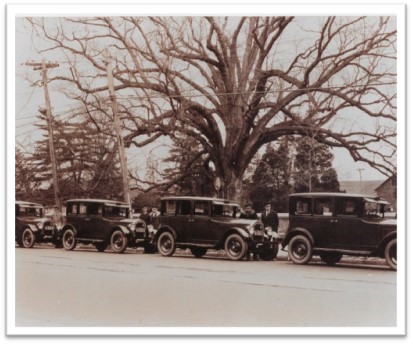Mighty Salem Oak before it crashed to the ground in June 2019.
ATLANTIC CITY In celebration of its 50th birthday and the 50th anniversary of America's first Earth Day on April 22, 2020, the Department of Environmental Protection will give the gift of a prized seedling from the famed Salem Oak to each of New Jersey's 565 municipalities for planting come spring, Commissioner Catherine R. McCabe announced this week.
McCabe made the announcement in a surprise video presented during the mayors' luncheon at the New Jersey League of Municipalities convention in Atlantic City.
It is with great joy that we extend these oak branches to all of you so that all of us -- together -- can create a lovely, lasting legacy, she said in the video. Fifty years from now, people will know that our shared commitment to protecting and respecting our environment ran as deep as the roots of the mighty Salem Oak.
For more than 500 years, the iconic Salem Oak stood on West Broadway in the historic city of Salem until June 6, when it suddenly crashed to the ground. The loss of the beloved oak was deeply felt by Salem residents and countless others throughout New Jersey and beyond.
Before its demise, the Salem Oak was one of New Jersey's best-known and most celebrated trees and was ranked among the state's largest white oaks. Located in the Salem Friends Burial Ground, the majestic oak was more than 100 feet tall with a truck circumference of approximately 22 feet. Its crown spanned 104 feet. Its age also exceeded the lifespan of most white oaks, which typically live 200 to 300 years.
The oak was also known for its illustrious history. It was the sole surviving tree from the original forest that covered the land when Quaker John Fenwick, founder of Salem, first arrived in 1675. According to legend, Fenwick met with Lenni Lenape Native Americans and signed a peace treaty under the oak's branches. The event is commemorated by a historical marker at the site.
Only months before the tree fell, foresters in the DEP Forest Service's Big and Heritage Tree Conservation program collected acorns at the base of the Salem Oak and saw no evidence that the tree's days were numbered. From those acorns, nearly 1,200 seedlings sprouted, were transferred into tubes and now are being nurtured in the greenhouse at the New Jersey Forest Service Nursery in Jackson Township.
 Salem Oak, from the collection of the Salem County Historical Society, Salem.
Salem Oak, from the collection of the Salem County Historical Society, Salem.
Come April 2020, seedlings will be carefully packaged and shipped to each of New Jersey's 565 municipalities for planting in a location that would ensure each one survives and thrives. The DEP is timing the statewide distribution to mark the DEP's 50th birthday on April 22, which also is the 50th anniversary of America's first Earth Day. It also coincides with Arbor Day on April 24 when everyone is encouraged to plant trees and weather conditions generally are best for success. The public will be given an opportunity to purchase these seedlings.
When shipped, each seedling will be accompanied by a certificate to authenticate its heritage as the progeny of the Salem Oak. The DEP is preparing a video that explains how to properly plant the seedlings.
In addition, the DEP is designing a special webpage that will enable all municipalities to share details on their seedling planting this coming spring.
Generations of New Jerseyans will reap the benefits of this extraordinary planting, McCabe said in the video, which features an informative and visually beautiful tour of the Forest Service Nursery.
The seedlings also represent an important bridge connecting the Salem Oak's past with New Jersey's future by helping to reduce the harmful effects of climate change.
Planting trees can help reduce global warming, by removing carbon dioxide from the air. Carbon dioxide is a greenhouse gas that is a major contributor to global warming. DEP foresters estimate that over 50 years, these 565 trees will sequester approximately 2.1 million pounds of carbon dioxide, conserve 1.2 million kilowatt hours of electricity -- which is the equivalent of 143 years of electricity for one household -- and intercept approximately 27.1 million gallons of stormwater, among many other environmental benefits.
The video is narrated by New Jersey State Forester John Sacco.
Heritage trees have significant historic value, Sacco said. Big trees are prized for their size and provide 600 times the environmental benefits of typical trees.
Those benefits include producing oxygen, intercepting airborne particulates and enhancing respiratory health. Trees also prevent flooding, provide wildlife habitat and reduce electric bills by shading homes. Access to trees, green spaces and parks promotes greater physical activity, and reduces stress, while improving the quality of life in our cities and towns.
View the video here: http://youtu.be/1pLHbG4eq1o
For more information on New Jersey's Big and Heritage Tree program, visit www.nj.gov/dep/parksandforests/forest/community/bigtree_intro.html.